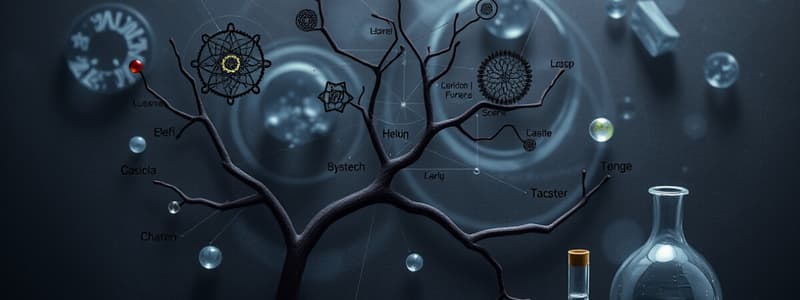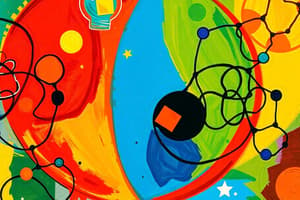Podcast
Questions and Answers
Which branch of science primarily focuses on studying living organisms and life processes?
Which branch of science primarily focuses on studying living organisms and life processes?
- Physics
- Chemistry
- Economics
- Biology (correct)
What is the first step in the scientific method?
What is the first step in the scientific method?
- Observation (correct)
- Experimentation
- Conclusion
- Hypothesis
Which of the following best describes a 'theory' in scientific terms?
Which of the following best describes a 'theory' in scientific terms?
- A well-substantiated explanation of an aspect of the natural world (correct)
- A personal opinion about a scientific phenomenon
- A statement based on repeated observations
- A testable hypothesis
What is the purpose of a control group in an experiment?
What is the purpose of a control group in an experiment?
Which ethical consideration in scientific research relates to protecting participant information?
Which ethical consideration in scientific research relates to protecting participant information?
What does peer review contribute to the scientific process?
What does peer review contribute to the scientific process?
Which of the following is a key aspect of natural sciences?
Which of the following is a key aspect of natural sciences?
What is an emerging trend in the future of science?
What is an emerging trend in the future of science?
Flashcards are hidden until you start studying
Study Notes
Definition of Science
- Systematic enterprise that builds and organizes knowledge
- Involves observing, experimenting, and theorizing to understand the natural world
Branches of Science
-
Natural Sciences
- Physics: Study of matter, energy, and the fundamental forces of nature
- Chemistry: Study of substances, their properties, and reactions
- Biology: Study of living organisms and life processes
-
Formal Sciences
- Mathematics: Study of numbers, quantities, shapes, and patterns
- Logic: Study of reasoning and argumentation
-
Social Sciences
- Psychology: Study of the mind and behavior
- Sociology: Study of society and social behavior
- Economics: Study of the production, distribution, and consumption of goods
Scientific Method
- Observation: Gathering data through senses or instruments
- Hypothesis: Formulating a testable statement based on observations
- Experimentation: Conducting experiments to test the hypothesis
- Analysis: Interpreting data and results from experiments
- Conclusion: Drawing conclusions based on the analysis, confirming or refuting the hypothesis
- Peer Review: Submitting findings for review by other experts in the field
Importance of Science
- Helps understand the natural world and phenomena
- Drives technological advancements and innovations
- Informs public policy and decision-making
- Promotes critical thinking and problem-solving skills
Key Concepts
- Theory: A well-substantiated explanation of an aspect of the natural world
- Law: A statement based on repeated experimental observations that describes some aspect of the world
- Variable: Any factor that can change in an experiment
- Control Group: A group that does not receive the experimental treatment, used for comparison
Ethical Considerations
- Importance of ethical guidelines in research
- Issues of consent, confidentiality, and integrity
- Responsibility to communicate findings accurately and transparently
Future of Science
- Interdisciplinary approaches combining multiple fields
- Advances in technology such as AI and data analysis
- Growing importance of sustainability and environmental science
Definition of Science
- A systematic approach to building and organizing knowledge about the natural world.
- Engages in a process of observation, experimentation, and theorization.
Branches of Science
-
Natural Sciences: Focus on the physical world.
- Physics: Explores matter, energy, and natural forces.
- Chemistry: Investigates substances, their properties, and chemical reactions.
- Biology: Examines living organisms and various life processes.
-
Formal Sciences: Involves abstract systems and structures.
- Mathematics: Analyzes numbers, quantities, and geometric forms.
- Logic: Examines principles of reasoning and argumentation.
-
Social Sciences: Studies human behavior and societal dynamics.
- Psychology: Investigates mental processes and behaviors.
- Sociology: Analyzes societal structures and interactions.
- Economics: Studies production, distribution, and consumption patterns.
Scientific Method
- Observation: Collection of data using senses or tools.
- Hypothesis: Creation of a testable proposition based on observations.
- Experimentation: Execution of tests to evaluate the hypothesis.
- Analysis: Data interpretation and result evaluation from experiments.
- Conclusion: Summarization of findings, confirming or challenging the hypothesis.
- Peer Review: Process of expert evaluation of research findings.
Importance of Science
- Enhances comprehension of natural phenomena.
- Fuels advancements in technology and innovation.
- Informs policies and governance through evidence-based research.
- Fosters critical thinking and effective problem-solving skills.
Key Concepts
- Theory: A comprehensive explanation of natural phenomena supported by evidence.
- Law: A consistent observation that describes a principle in nature.
- Variable: Any factor in an experiment that can change or be manipulated.
- Control Group: A baseline group not subjected to treatment, allowing for comparison.
Ethical Considerations
- Emphasizes the importance of ethical standards in conducting research.
- Addresses issues like consent, confidentiality, and integrity in research practices.
- Highlights the obligation to report findings honestly and transparently.
Future of Science
- Encourages interdisciplinary collaboration across various scientific fields.
- Leverages advanced technologies such as artificial intelligence and data analysis.
- Elevates the significance of sustainability and environmental sciences for future research.
Studying That Suits You
Use AI to generate personalized quizzes and flashcards to suit your learning preferences.




